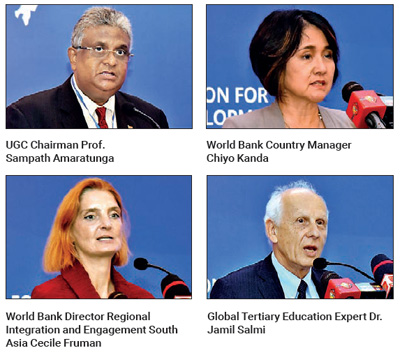Thursday Feb 19, 2026
Thursday Feb 19, 2026
Wednesday, 7 June 2023 00:00 - - {{hitsCtrl.values.hits}}
By Darshana Abayasingha
 The World Bank and the University Grants Commission of Sri Lanka yesterday kicked-off a two-day conference on Regional Cooperation or Higher Education Development – Options for South Asia in Colombo.
The World Bank and the University Grants Commission of Sri Lanka yesterday kicked-off a two-day conference on Regional Cooperation or Higher Education Development – Options for South Asia in Colombo.
The program aims to deliver a comprehensive report on Regional Integration for Higher Education Development, showcase Sri Lanka’s recent program of reforms and to bring the regional network together to discuss further opportunities for progress.
Welcoming participants, UGC Sri Lanka Chairman Prof. Sampath Amaratunge, detailed past World Bank programs in Sri Lanka and their contribution towards advancing education in Sri Lanka. This included the IRQUE program in 2003, a second program to support higher education in the country in 2011 and a further effort to support enrolment of students in priority disciplines.
As a result, for the first time offered State universities a system to partner with the private sector for better technology transfers. He noted that research should be an integral part of tertiary education.
“These activities helped advance global university rankings for Sri Lankan higher education institutes. But an increase in enrolment of undergraduates alone won’t help the country. Therefore, I would like to invite the World Bank to consider a fourth funded project considering the current economic situation of the country and the short and long-term objectives of the Sri Lankan Government,” Prof. Amaratunge said.
World Bank Country Sri Lanka Manager Chiyo Kanda, said the South Asian region has made tremendous progress in sending children to school and affording better opportunities for higher education, but noted more investments are needed to cope with increasing student numbers and to ensure higher education offers greater technology and better levels of engagements.
The World Bank officials noted there has been great cooperation within the region on climate change, trade, economic connectivity and transport but not enough on human development over the past decade.
The World Bank too has not been presented with an adequate opportunity to offer support on this aspect, and despite embarking on the topic from a “low base” they noted many of the challenges faced by the countries are similar both within and outside institutions. All countries could perform stronger if they collaborate, conduct research and pool their resources, and Sri Lanka shows a great deal of leadership in many aspects, they noted.
Pix by Ruwan Walpola